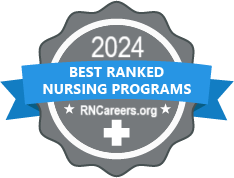What is a Bachelor’s of Science in Nursing?
A bachelor’s of science in nursing (BSN) is a 4-year degree designed to prepare you to work as a registered nurse (RN). During this time you will be prepared through didactic education and clinical experiences to care for patients in a variety of settings. During your training you will learn to become a safe and effective nurse by taking courses in the hard sciences, nursing theory, clinical assessment, and more. You will be taught skills that will enable you to think critically about the nursing care that you deliver to your patients. At the end of your degree you will be qualified to sit for the NCLEX exam that credentials you at the national level as an RN. With a BSN you will be highly employable at major hospitals and healthcare organizations around the country.
Why Should I Earn a BSN?
With so many pathways existing to becoming an RN it can be hard to know which route to take. If you are ready to earn your 4-year bachelor’s degree and want to work as an RN, a BSN may be the right path for you. While earning an associate’s degree in nursing (ADN) was the original and most popular way to become a nurse, many healthcare organizations are shifting towards having the BSN become the baseline degree for them hiring RNs. By earning your BSN you will be a strong candidate in your applications to nursing jobs. Additionally, if you choose to move past a bachelor’s degree to become an advanced practice registered nurse (APRN) or earn your PhD, a bachelor’s is the minimum degree requirement for these programs.
Best Ranked BSN Degree Programs in Your State

One of the best measures of a nursing program’s ability to prepare its students to become a registered nurse is to look at an institution’s first-time NCLEX-RN pass rates. We went directly to each state board of nursing to find, report and rank the best Bachelor of Science in Nursing programs in your state. Find a campus or online BSN degree program, see NCLEX Exam rankings by school along with tuition costs, average loan rates, and additional data points that will help you find the best RN program for your career.
- Alabama
- Alaska
- Arizona
- Arkansas
- California
- Colorado
- Connecticut
- Delaware
- Florida
- Georgia
- Hawaii
- Idaho
- Illinois
- Indiana
- Iowa
- Kansas
- Kentucky
- Louisiana
- Maine
- Maryland
- Massachusetts
- Michigan
- Minnesota
- Mississippi
- Missouri
- Montana
- Nebraska
- Nevada
- New Hampshire
- New Jersey
- New Mexico
- New York
- North Carolina
- North Dakota
- Ohio
- Oklahoma
- Oregon
- Pennsylvania
- Rhode Island
- South Carolina
- South Dakota
- Tennessee
- Texas
- Utah
- Vermont
- Virginia
- Washington
- West Virginia
- Wisconsin
- Wyoming
Entrance Requirements for BSN Programs
To an extent, every university will have different entry requirements. Most of them will be similar to what is required by the University of Virginia:
- In order to apply for BSN programs you must have a high school diploma or have completed your GED. With this you need to be able to include your GPA on your applications. Most programs will require a minimum GPA of 3.0. If you do not have this, you can take some college level courses to prove your academic ability prior to applying.
- You will need gather some letters of recommendation for your application. Depending on the program you may be required to include some professional and personal recommendations. These can be obtained from teachers, employers, and/or acquaintances who can attest to your character.
- All bachelor’s programs require that you submit an application along with a fee. The individual application requirements and fees will vary by university. With the application you will need to send official transcripts from your prior education.
- Depending on the program an interview may be required. Don’t fret, they want you to be a fit for their program as much as you do!

Have you Already Earned an RN?
What Pathways Exist for Earning My BSN?
Generally there are four ways you can earn your BSN.
- High school to BSN: After finishing high school or earning your GED you can earn your BSN in about 4 years.
- LPN to BSN: These programs give you credit for the nursing education you already have. LPN to BSN programs are about 2-years in length depending on the program. They are designed for people who already have some nursing experience and education at the LPN level.
- RN to BSN: If you are an RN with an ADN and are hoping to advance your degree to the bachelor’s level you can complete a specially designed program for people who have already passed the NCLEX and work as RNs. An RN to BSN route will give you classes you have not had previously such as evidence based practice, additional hard science courses, ethics, and more. Learn about the differences, read RN vs BSN Degree.
- Direct Entry: Direct Entry BSN programs have been developed to help meet the growing nursing demand while also helping individuals to achieve their goals of becoming nurses after they have earned their bachelor’s in another field. These programs give you credit for the bachelor’s required courses you have already done such as English, history, math requirements and more, while arming you with the additional course you need to become an RN. Depending on your background you may be required to take prerequisite courses before applying to these programs.
Online BSN Programs
With technology the world is becoming an increasingly flexible place for people seeking to advance their education. Online BSN programs can allow you to balance your personal, professional, and academic life effectively. Often these programs have online classes, assignments, and discussions. You can work with your school to organize your clinical requirements at a location and time that is convenient for you.
What Will I Study in My BSN Program?
To be eligible to sit for the NCLEX and become an RN there are certain courses that a required regardless of what school you go to. Additionally, to earn a bachelor’s degree in any field there are also certain “core courses” that you must take. These will often have nothing to do with nursing and there are only a few that you will need to do during your 4 year education. You can expect your coursework to look similar to some of those offered at Boston College:
- Pharmacology
- General Chemistry
- Population Health Theory
- Anatomy and Physiology
- Pathophysiology
- Ethics in Nursing
- Principles of Evidence-Based Nursing
- Pediatric Nursing Theory and Clinical
- Adult Health Nursing Theory and Clinical
- Maternal-Newborn Nursing Theory and Clinical
- Psychiatric-Mental Health Nursing Theory and Clinical
- Health Assessment Theory and Clinical
Clinical Requirements
The minimum hours of clinical training that are required will be ultimately determined by the state in which you plan to become licensed. In general, most states require around 500 hours of hands on supervised clinical care. These experiences are a time for you to combine your knowledge gained in class with the skills you have been taught to provide care to real patients in a supervised setting. This allows you to be a safe learner so that you can go out into the world and practice as a safe nurse. Your supervisor will be an experienced RN who can assist you with his/her expert clinical judgement.
How Much Will a BSN Degree Cost?
Like a bachelor’s in any field pricing can vary quite a bit depending on the school. With nursing there are many options for getting your education paid for either before, during, or after your schooling. When looking at programs you can expect private schools will cost more than public ones. Here are examples of both:
- Southern Connecticut State University: $10,954/year
- Boston College: $1,404/credit or $42,120/year
Through the Nurse Corps Loan Forgiveness program as well as the Public Service Loan Forgiveness you can get your student loans forgiven by working with medically underserved populations. Knowing that you have ways of paying off your degree other than just your salary can help you decide to pursue your BSN in the first place. There are additional ways that you can get your education paid for listed here:
- Perkins Loan Cancellation
- Individual Hospital Repayment Programs
- Military Programs
When applying to programs check out our state guides to see if there are additional scholarships offered through your state!
How Much Do Nurses With a BSN Earn?
RNs earn respectable salaries. This is one of the many traits that make this career so desirable. What you make will depend on a few things. Your experience, work location (urban versus rural), and area of practice will all play a role. If you work in a big city you will probably make more than your friend who works in a small rural town. Community health settings will not pay as much as private practice settings but they also could make you eligible for the previously mentioned loan forgiveness plans. According to the Bureau of Labor Statistics, RNs earn a median of $66,640 annually. The best paying states are in California, Hawaii, Alaska, Massachusetts, and Oregon with salaries ranging from $80,000 to $96,000.
What are Some Specialty Areas I Could Work in with a BSN?
Having your BSN will really open the doors of nursing for you. You will be highly sought after by hospitals and recruiting agencies. With a BSN you will be able to work in almost any specialty. Some of these are listed here:
- Emergency Department Nurse: You will work as a part of a team to triage, assess, and care for patients with medical emergencies.
- Labor and Delivery Nurse: As a labor and delivery nurse you will care for women while they are in labor and help deliver their babies.
- Oncology Nurse: You will manage the care of patients with cancer, whether it be during chemo, after surgery, or after radiation.
- Home Health Nurse: With this job you will go to people’s homes to make sure that they are receiving proper care whether it be for diabetes management, wound care, or medication management.
- Medical Surgical Nurse: You will work in a hospital on a floor caring for patients with acute conditions or who are recovering from surgery.
- Operating Room Nurse: You will be a part of the operating room staff to care for patients while they are under anesthesia during surgery.
4 Steps To Register for the NCLEX
Signing up for the NCLEX can take some time so you should prepare in advance. Work with your school to make sure that you have everything you need to register. Here are the general steps you will need to take in order to make sure you ready for test day.
- You will have to go through your State Board of Nursing (BON) to sign up so that you can be eligible to sit for the NCLEX. The NCBSN website will have information on your state’s BON. NCLEX exams can be taken every week, but the registration process can take weeks. So plan ahead.
- You can find NCLEX eligibility requirements through your BON.
- You will then have to register through Pearson VUE for the NCLEX . You will also need a program code to do this! Check with your school if you need help with this.
- Once the date is set you can use our NCLEX tips and practice exams to prepare for test day!
More BSN Options

Find Nursing Schools
Join a Top-Ranked Nursing School for a Life-Changing Career!
- About the Author
- Latest Posts
Lauren is a Registered Nurse and Women’s Health Nurse Practitioner who works in an OB/GYN clinic in the Boston area. She completed a Direct Entry MSN program at Boston College in May 2017 after obtaining a BS in Forensic Science and a BS in Biology from the University of New Haven, so she has special awareness of how confusing the many paths to nursing can be! She is passionate about enhancing and clarifying the nursing role globally as well as combatting human trafficking from a public health standpoint. In her free time Lauren enjoys writing and traveling.







